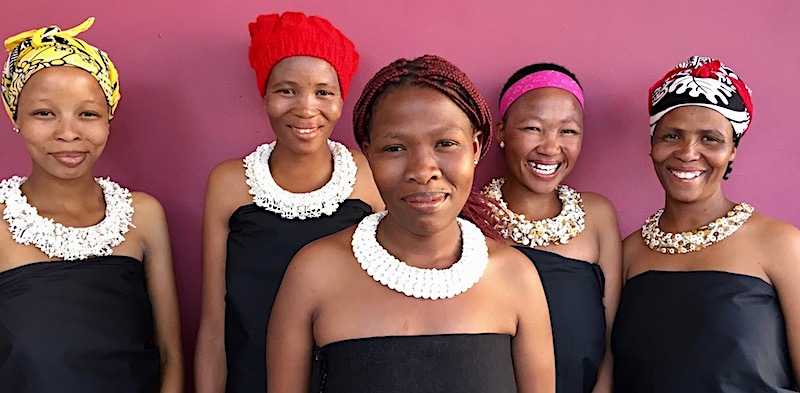

Friends will be friends – even in the midst of a pandemic
5th January 2021
The COVID-19 pandemic has left a trail of economic devastation and rising poverty levels throughout Africa. Industries linked to international tourism have been hit hardest, as international travel was the first casualty in the war against the virus, and will be the last industry to revive. In these desperate times, many are left financially stranded as each business sheds employees and cuts costs. After all, it's nothing personal – it's just business.
For Karin le Roux, founding Director of the Omba Arts Trust, nothing could be further from the truth. Her three decades of dedication to helping rural Namibian women is extremely personal. As a social enterprise, Omba Arts is indeed a business that markets Namibian handmade products to local and international markets, but its heart beats for the women behind the art.
Since Namibian independence in 1990, long before Omba Arts took its current form, Karin followed her passion for empowering women to the very ends of her vast country. As an art teacher who understands the design potential of local handicraft skills and cultures, she is uniquely qualified to provide a link between women with minimal or no formal education and the international traveller with an eye for high-quality, authentic crafts. Karin's expertise is matched by a special concern for the marginalised San people, whose ancient traditional way of life has been overrun by modern day agriculture and commercial interests.
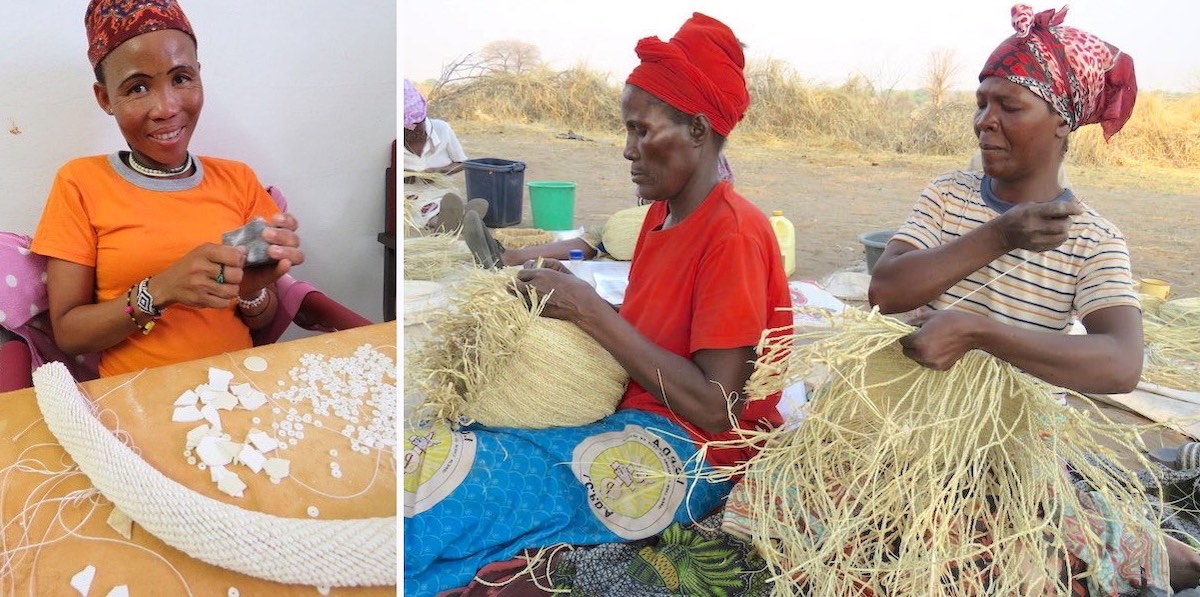
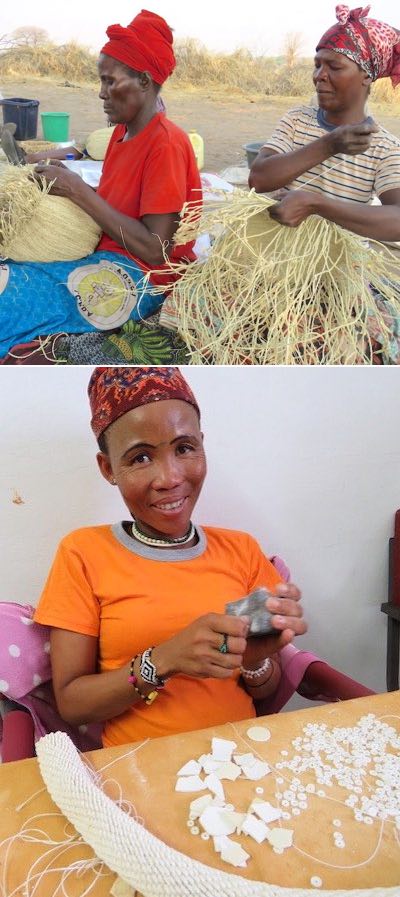
In 2019, the Finnish Embassy to Namibia honoured Karin with the Hän Award, alongside only one other African. This award acknowledges efforts to promote equality and inclusivity, especially among marginalised communities, around the world. While receiving such an award was a great honour for Karin, Omba Arts now faces perhaps its greatest ever challenge since inception – COVID-19.
A staggering 90% of Omba's income was wiped out when international tourism shut down in early 2020. Without a market, Omba Arts could no longer afford to buy crafts from the 400 artisans around the country, who in turn support about 2,000 family members.
As Namibia locked down even domestic travel, Omba Arts Trust went into hibernation,
Karin recalls, But as the weeks turned to months, we realised we had to do something — to save Omba, support our artisans, and keep the supply chains going.
The pandemic has not hit the sparsely populated rural areas that Omba works with directly, but its economic consequences have been severe. As one of the San artisans exclaims, I don't even know the name of that disease that everyone is talking about that has turned our lives upside down!
After devoting so much of her life to women across the country, Karin could not simply give up and walk away. These artisans were not just suppliers, they are Omba's friends with whom they have built mutual trust and relationships over many years. She knew that without the income from Omba they would be left with nothing. These artisans have become fruitful trees
in communities that are marked by desperate poverty and all its attendant social problems. As one of the San artisans, Mara Britz declares: Omba is the water that nourishes us so that our roots can grow, we can bear fruit and bring food (for our families).
Without this life-giving water, these women and their communities will have little hope of escaping the poverty trap.
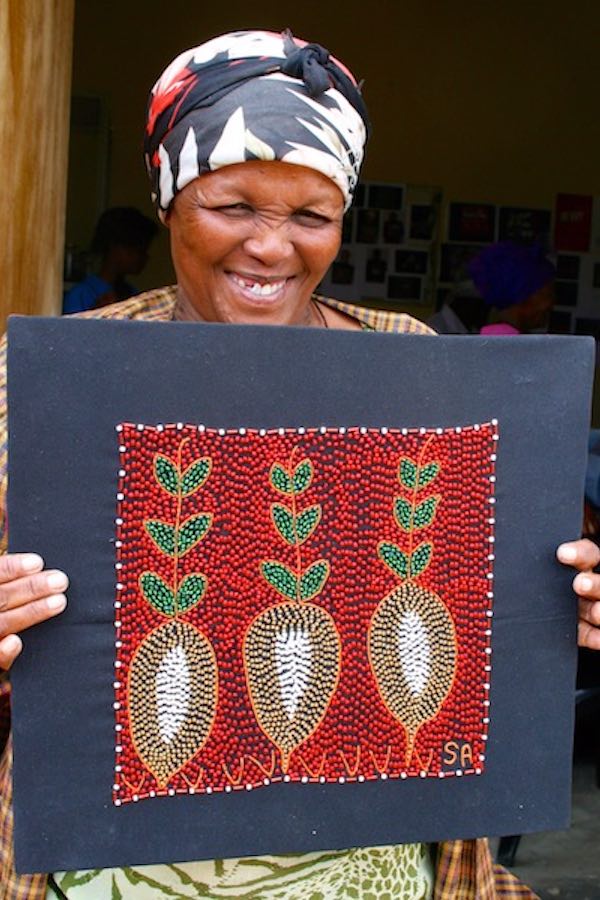
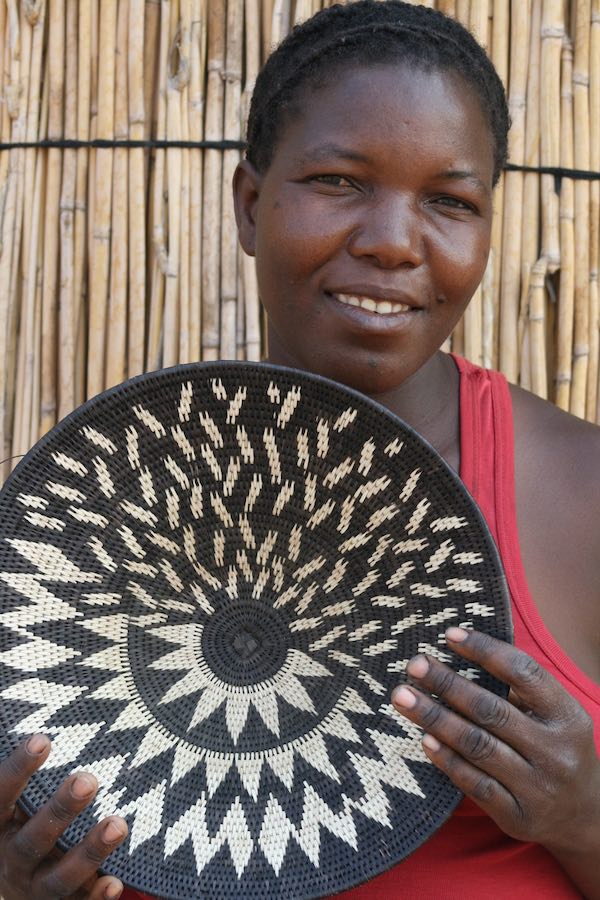
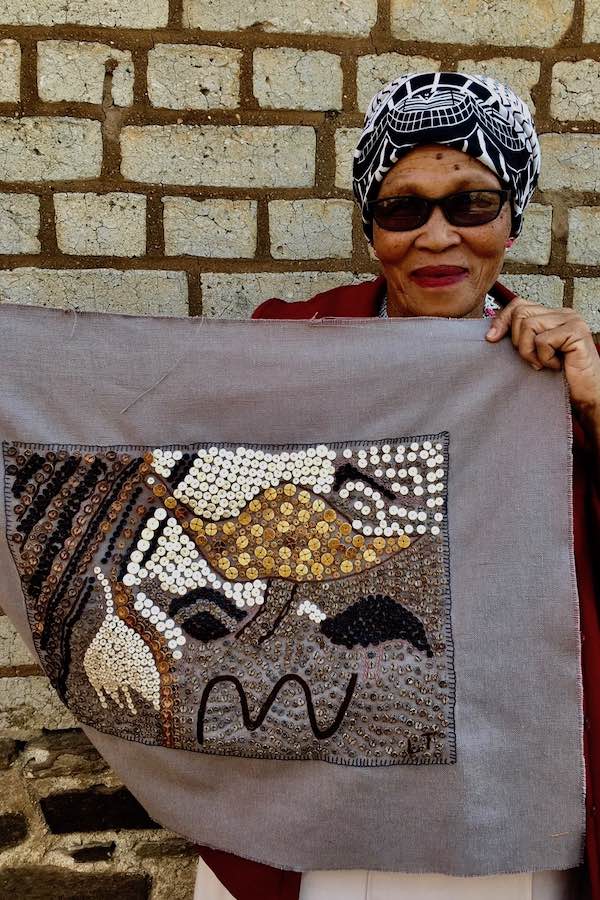
Soon after the lockdown conditions eased, the Omba team headed off into the Kalahari in Namibia's Omaheke region to see how their artisans were faring and to bring them much-needed food parcels. Despite the market crashing, Omba put in an order for some crafts made from ostrich eggshells to provide the women with some financial relief. They also distributed and installed tippy taps
(foot-activated hand washing units), donated by Namibia Chamber of Environment, in these remote villages to reduce the spread of COVID-19.
The artisans in Omaheke are just one of several groups around Namibia that rely on Omba, however, and Karin is acutely aware that much more support is needed for a longer period of time to see them through this crisis. Given their well-established relationships and deep understanding of these remote rural communities, Omba is perfectly positioned to provide help in ways that truly meet the challenges these women face. But without a sustainable income through sales to tourists, Omba cannot do this alone.
In a bid to create awareness and raise funds for the artisans, the Omba team produced a short film with generous assistance from filmmaker Andy Botelle, who offered to waive his professional fees if Omba could not raise sufficient funding to cover this cost. This touching film captures the unscripted, exuberant joy and gratitude for the help Omba has provided, both before and during the pandemic.
While this fund-raising drive is specifically to help the artisans survive in the short-term, the long-term future of Omba itself also requires urgent attention. Up to this point, the Trust has relied almost entirely on sales to tourists visiting Namibia, but it is likely to take years before tourist numbers reach pre-COVID levels again. Until then, they need to take their 100% Namibian merchandise online and adapt their product ranges for the export market.
Products made from eggshell beads make lovely jewellery,
Karin observes, but we will need to move towards selling larger items for home décor as this is where international experts tell us the market is growing due to people spending so much time in their homes.
Doing this will require substantial investment into new online advertising channels, maintaining their new website [link] and, crucially, providing training to the artisans to move from producing jewellery to products more suited to the home interiors market. Omba is thus looking for longer-term support from partners that share their passion for sustainable development and women empowerment.
If you are in a position to help these artisans and their communities weather the COVID-19 storm, please donate here. If you can help Omba Arts Trust with long-term support to ensure that this pandemic isn't the end of the line for this unique Namibian enterprise, contact Karin le Roux on karin.leroux@omba.org.na
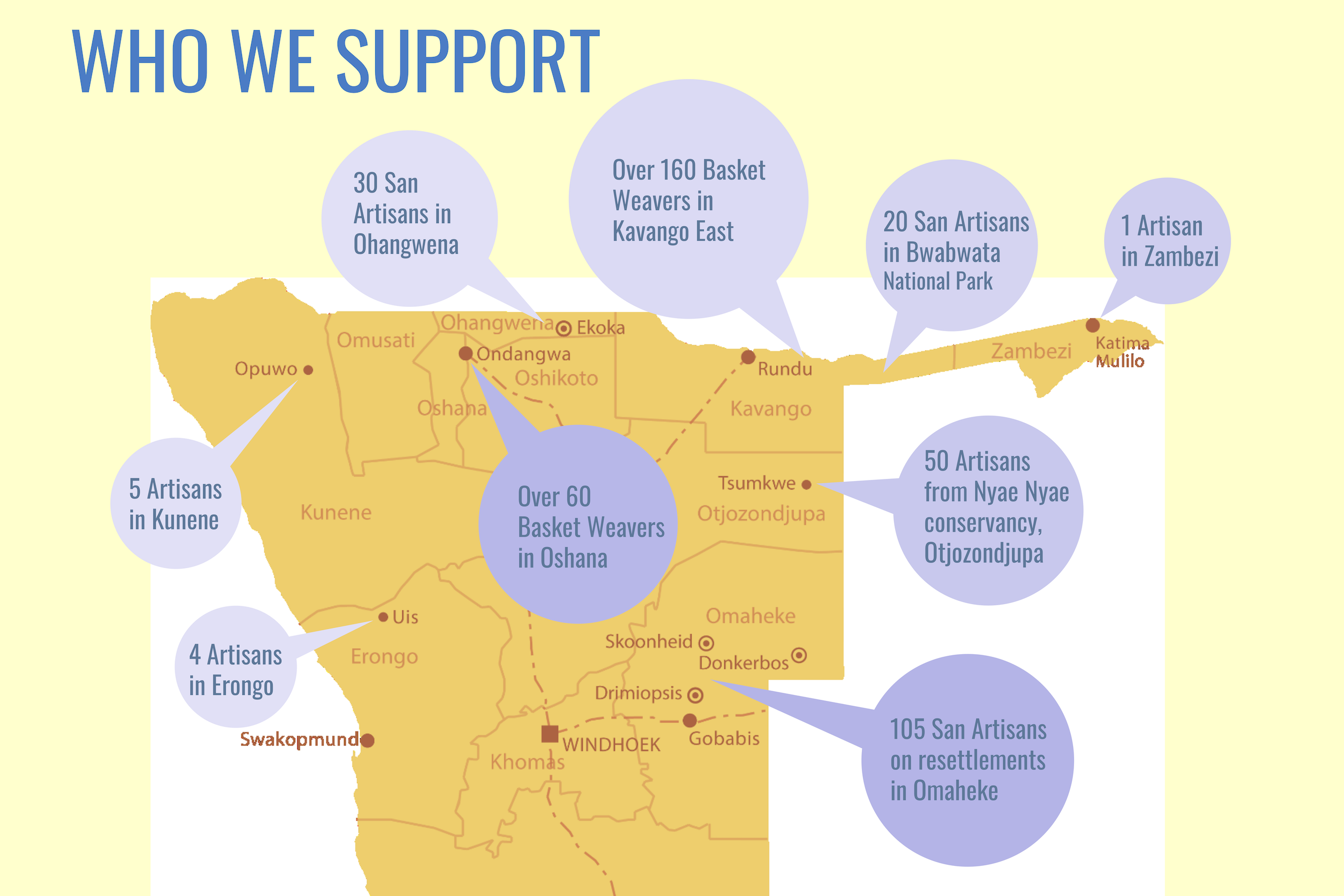
For articles on similar topics, please click one of the following options:
If you enjoyed this page, then you might also like:




Omba Arts Trust was established in 2004 but emanated out of the Rössing Foundation’s craft programme started in the early 1990’s. Its mission is to support the sustainable livelihoods of marginalised communities through craft development and marketing and food security. 95% of the 400 artisans Omba supports in nine regions are women and 60% of these are San. Omba has worked on numerous programmes relating to skills development, sustainable natural resource use, and social upliftment. Omba is a member of the Namibian Association of CBNRM Support Organisations (NACSO), and was the first Namibian organisation to be registered with the World Fair Trade Organisation.
www.omba.org.naOmba Arts Trust was established in 2004 but emanated out of the Rössing Foundation’s craft programme started in the early 1990’s. Its mission is to support the sustainable livelihoods of marginalised communities through craft development and marketing and food security. 95% of the 400 artisans Omba supports in nine regions are women and 60% of these are San. Omba has worked on numerous programmes relating to skills development, sustainable natural resource use, and social upliftment. Omba is a member of the Namibian Association of CBNRM Support Organisations (NACSO), and was the first Namibian organisation to be registered with the World Fair Trade Organisation.
www.omba.org.na
Karin le Roux is the founding Director of Omba Arts Trust. She worked for the Rössing Foundation from 1991 as an art teacher where she focused on teaching adults from rural communities how to produce high-quality crafts. She also initiated the first contemporary San art project with San living on resettlement farms. She directed the Namibia Craft Centre from 1996 – 2011 expanding the centre and the number of visitors, thus providing an important outlet for Namibian products, and finally established Omba Arts Trust in 2004. Through Omba, she has partnered with many other Namibian non-governmental organisations that support community conservation and sustainable development initiatives.
Karin le Roux is the founding Director of Omba Arts Trust. She worked for the Rössing Foundation from 1991 as an art teacher where she focused on teaching adults from rural communities how to produce high-quality crafts. She also initiated the first contemporary San art project with San living on resettlement farms. She directed the Namibia Craft Centre from 1996 – 2011 expanding the centre and the number of visitors, thus providing an important outlet for Namibian products, and finally established Omba Arts Trust in 2004. Through Omba, she has partnered with many other Namibian non-governmental organisations that support community conservation and sustainable development initiatives.
We use cookies to monitor site usage and to help improve it. See our Privacy Policy for details. By continuing to use the site, you acknowledge acceptance of our policy.